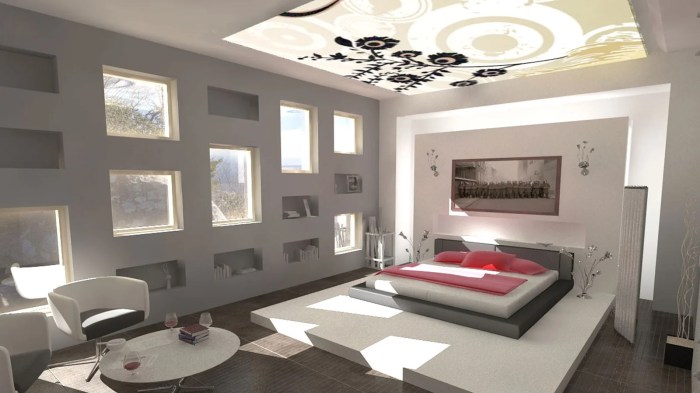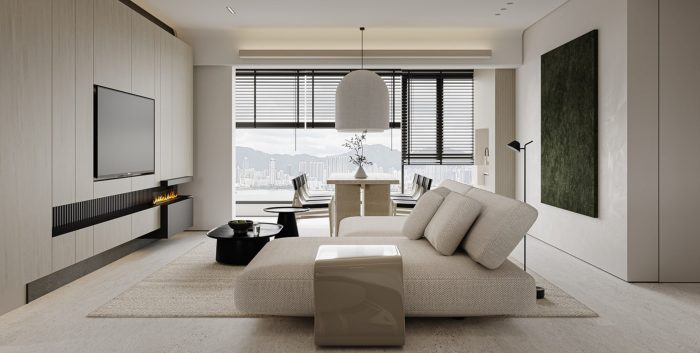As Minimalist Interior Redesign for Smart Homes takes center stage, this opening passage beckons readers into a world crafted with good knowledge, ensuring a reading experience that is both absorbing and distinctly original.
Minimalist interior design and smart home technology are no longer separate entities but are now seamlessly integrated to create a harmonious living space that combines aesthetics with advanced functionality. This article delves into the fascinating realm of minimalist interior redesign for smart homes, exploring the benefits, essential elements, sustainable practices, and innovative ideas that define this modern approach to home design.
Introduction to Minimalist Interior Redesign for Smart Homes
Minimalist interior design is a style characterized by simplicity, clean lines, and a focus on functionality. It aims to create a sense of calm and tranquility by eliminating excess clutter and decorations.
Smart homes, on the other hand, are residences equipped with technology that allows homeowners to control and automate various aspects such as lighting, heating, and security. These technologies enhance convenience, energy efficiency, and overall quality of life.
Benefits of Combining Minimalist Interior Design with Smart Home Technology
- Efficiency: Integrating smart home technology into a minimalist design allows for streamlined control of various home systems, saving time and energy.
- Aesthetics: The sleek and modern look of minimalist design complements the high-tech features of smart home devices, creating a cohesive and stylish living space.
- Space Optimization: Minimalist design principles help maximize space utilization, while smart home gadgets can be discreetly incorporated into the overall design.
- Enhanced Living Experience: The combination of minimalist aesthetics and smart home technology offers a more comfortable, convenient, and sophisticated lifestyle.
Examples of Successful Minimalist Interior Redesign Projects for Smart Homes
One notable example is the transformation of a traditional home into a minimalist smart home, where integrated systems allow for remote control of lighting, temperature, and security. The clean lines and minimalistic furniture enhance the futuristic feel of the space.
Another successful project involved the renovation of a small apartment using minimalist design principles and smart home devices to create a multifunctional and efficient living environment. The use of smart appliances and automated systems optimized the limited space without compromising on style.
Essential Elements of Minimalist Interior Design

Minimalist interior design is characterized by simplicity, clean lines, a limited color palette, and a focus on functionality. These key elements work together to create a sense of space and tranquility within a home, promoting a calm and uncluttered environment.
Clean Lines and Simplistic Design
One of the essential elements of minimalist interior design is the use of clean lines and simplistic design. By incorporating straight lines and geometric shapes, minimalist spaces feel uncluttered and visually appealing.
Neutral Colors
Neutral colors such as white, beige, gray, and black are commonly used in minimalist interior design. These hues help create a sense of calm and serenity, while also allowing other elements in the room to stand out.
Functional Furniture
Functional furniture is another key component of minimalist interior design. Pieces are selected for their practicality and simplicity, often featuring sleek designs and multifunctional capabilities. This approach maximizes space and minimizes visual clutter.
Creating a Sense of Space and Tranquility
The combination of clean lines, neutral colors, and functional furniture in minimalist interior design helps to create a sense of space and tranquility. By eliminating unnecessary elements and focusing on essentials, minimalist spaces feel open, airy, and peaceful.
Comparison with Other Styles
Minimalist interior design stands out from other styles such as traditional or eclectic design by its emphasis on simplicity and minimalism. While traditional styles may feature ornate details and rich colors, minimalist design opts for a more streamlined and understated approach.
Tips for Incorporating Minimalist Design Principles
When incorporating minimalist design principles into different rooms of a smart home, consider decluttering and simplifying the space. Choose furniture with clean lines, opt for a neutral color palette, and prioritize functionality. Additionally, maximize natural light and incorporate storage solutions to maintain a minimalist aesthetic.
Integrating Smart Home Technology in Minimalist Design
Smart home technology has revolutionized the way we interact with our living spaces, offering convenience, efficiency, and enhanced security. When it comes to minimalist interior design, integrating smart home features can be a seamless process that complements the clean lines and clutter-free aesthetic.
Types of Smart Home Devices and Technologies
There are various types of smart home devices and technologies available for integration, ranging from smart lighting systems and thermostats to voice-controlled assistants and security cameras. These devices can be discreetly incorporated into the minimalist design to maintain a sleek and uncluttered look.
Seamless Incorporation of Smart Home Features
- Opt for smart devices with minimalist designs that blend seamlessly with your interior decor.
- Hide wires and cables to maintain the clean aesthetic of the space.
- Choose smart home features that prioritize functionality without sacrificing the minimalist style.
Role of Automation in Minimalist Smart Homes
Automation plays a key role in enhancing the functionality and efficiency of a minimalist smart home. By automating tasks such as adjusting lighting levels, controlling temperature, and managing security systems, you can streamline your daily routines and create a more comfortable living environment.
Innovative Integration Examples
- Installing smart blinds that can be controlled remotely or programmed to open and close based on the time of day.
- Using smart sensors to detect occupancy and adjust lighting and temperature settings accordingly.
- Incorporating smart mirrors with built-in displays for weather updates, calendar notifications, and more.
Sustainable Practices in Minimalist Interior Redesign
Incorporating sustainable practices in minimalist interior redesign for smart homes is vital for reducing environmental impact and creating a healthier living space. By utilizing eco-friendly design ideas and energy-efficient solutions, homeowners can contribute to a greener future while enjoying the benefits of a minimalist aesthetic.
Utilizing Natural Materials
Using natural materials such as bamboo, cork, reclaimed wood, and recycled glass can add warmth and texture to a minimalist interior. These materials not only look beautiful but also have a lower environmental footprint compared to synthetic alternatives.
Energy-Efficient Solutions
Integrating energy-efficient appliances, LED lighting, smart thermostats, and solar panels can significantly reduce energy consumption in a smart home. These solutions not only help lower utility bills but also decrease the home's overall carbon footprint.
Impact on Functionality and Aesthetics
Sustainable practices in minimalist interior redesign can enhance the functionality and aesthetics of a smart home. By choosing durable and eco-friendly materials, homeowners can create a space that is both visually appealing and long-lasting, promoting a sense of well-being and tranquility.
Case Studies and Success Stories
There are numerous case studies of minimalist smart homes that prioritize sustainability with great success. These homes showcase how sustainable practices can be seamlessly integrated into minimalist design, resulting in beautiful, functional spaces that benefit both the environment and the occupants.
End of Discussion

In conclusion, the marriage of minimalist interior design and smart home technology opens up a realm of possibilities for homeowners seeking a sophisticated yet practical living environment. By embracing simplicity, functionality, and sustainability, the concept of Minimalist Interior Redesign for Smart Homes offers a vision of the future where elegance meets efficiency seamlessly.
FAQ Summary
What are the key elements of minimalist interior design?
Key elements include clean lines, neutral colors, and functional furniture that contribute to a sense of space and tranquility.
How can smart home technology be seamlessly integrated into minimalist design?
Smart home features can be discreetly incorporated into the design, ensuring they complement rather than disrupt the minimalist aesthetic.
Why is sustainability important in minimalist interior redesign for smart homes?
Sustainability ensures a focus on eco-friendly design practices, such as using natural materials and energy-efficient solutions, which enhance both functionality and aesthetics.
Can minimalist interior redesign be applied to all rooms in a smart home?
Yes, minimalist design principles can be adapted to different rooms while maintaining a cohesive overall aesthetic throughout the smart home.









